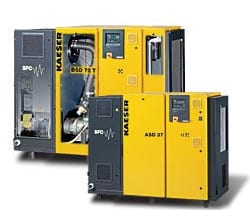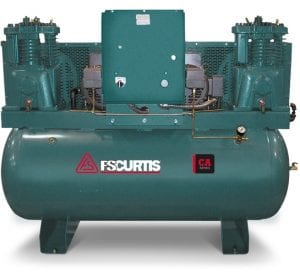Air Compressor Buying Guide: Everything You Need to Know
Air compressors serve us in many ways. For instance, air compressors power machines such as refrigerators, inflate car wheels, control fountains, assist scuba divers, and the list goes on.

Since they serve many uses, it is important to get the correct one. For example, you cannot use the same air compressor for inflating wheels to fill up a scuba tank. This is because the compressor that inflates wheels lacks sufficient pressure to fill up scuba tanks.
If you intend to get one, you must remember that they are not universal. Perhaps, you are wondering what other factors to consider before buying them. Here is an air compressor buying guide that can help you get started.
Decide Between Single-Stage Compressors vs Two-Stage Compressors
Do you require low or high pressure for your needs? Based on your answer, you will decide between the two types of air compressors to acquire.
Single-stage compressors generate low pressure of about 135 psi. They generate low pressure since they rely on one cylinder to pump air to the tank.
On the other hand, two-stage compressors rely on two cylinders. As a result, they generate high pressure at 175 psi.

In two-stage compressors, the air gets compressed in two stages. The first cylinder compresses the air at 90 psi and transfers it to the second cylinder. When the second cylinder compresses the air, it reaches the tank at a pressure of 175 psi.
Single-stage compressors are more suitable if your business involves fueling vehicles or powering pneumatic tools like nail guns. However, if you work in the aerospace and manufacturing industries, you need two-stage compressors.
So before choosing an air compressor, determine whether your business performs light-duty tasks like fueling vehicles or heavy-duty jobs like manufacturing.
Check the Air Compressor Horsepower
Air compressor horsepower ranges between 1.5 and 6.5. Typically, manufacturers will indicate the horsepower value of an air compressor on it. However, you cannot be sure whether the information on the air compressor is correct.
Manufacturers understand that most buyers buy air compressors with high horsepower. So, to ensure the ones with low horsepower sell, they fraudulently label them with a higher horsepower value.
To determine your compressor's horsepower, you will have to test how much electricity it uses to run it. Once you get it running, you can calculate its value. If you are unsure how to calculate the horsepower, you can do it online.
A unit of horsepower is equivalent to 745.8 watts. Observe how much power it uses by turning on the watt meter. Divide the value given by the watt meter over 745.8 to get the horsepower.
You will determine whether the horsepower is sufficient to power your machine from the value you get. For example, if you wanted an air compressor to pump water in residential homes and get its value at 3, it would not pump enough water to all homes. So you will need one of at least 8.
Consider the Air Compressor Size
Size is yet another essential air compressor buying guide to consider. Air compressor sizes have three categories: consumer-grade, professional grade, and industrial-grade.
The consumer-grade is small and portable, hence ideal for minor tasks like inflating wheels. Piston compressors generally fall in this category. The compressors rely on pistons that move up and down to trap atmospheric air.

The professional grade is more apt if you need to power several tools at once. This category does not depend on pistons to run. Instead, they rely on rotary screw technology.
Piston compressors do not allow continuous air. With insufficient air in them, they end up overheating.
Rotary screw technology allows air in through a continuous sweeping motion. The technique enables the compressor to allow plenty of air in to cool it and power machines like sandblasters in factories.
The industrial grade is suitable for continuous usage. Just like the professional grade, it uses rotary screw technology to run. Therefore, it is also ideal for heavy duty tasks like in factories.
Duty Cycle
The value of an air compressor's duty cycle is in percentage form. It indicates how long the compressor should run within a certain period. If you exceed the period, the air compressor's pump may get very hot and damage it.

An air compressor with a low duty cycle is ideal for light-duty tasks. On the other hand, if you want to do heavy-duty tasks, choose the one with a high duty cycle.
To further understand the duty cycle, we can compare one with a 25% duty cycle and a 100% duty cycle.
A 25% duty cycle air compressor's run time will be one-fourth of the total cycle time. Assuming the compressor's cycle time is 200 seconds, its run time will be 50 seconds. That means for every 50 seconds the compressor runs; you need to wait for 1minute and 50 seconds before you power it.
Since you have to wait before using such a compressor again, it can only be suitable for domestic uses.
On the other hand, a compressor with a 100% duty cycle can run continuously. However, due to the non-stop compression of air, the process is bound to generate some heat in the compressor. Therefore, you will need to ensure a cooling component to reduce the overheating.
Since a 100% duty cycle is non-stop, it is best suited for industrial use.
Other duty cycle values you may come across include 30%, 50% and 75%. You only need to remember to find the percentage of the total cycle time and allow the compressor to rest based on the value you get after calculating.
Moisture Problems
Whenever air is compressed, it becomes warmer. Therefore, if you overwork the air compressor, the compressed air would become hot and then lead to overheating.
Later on, the hot air condenses. If the condensation process occurs within the compressor's pipe, it forms moisture, damaging it. So you have to ensure that your compressor condenses the air away from it.
To reduce overheating, get a bigger air compressor. Then, you can overwork your air compressor without ever needing to worry about overheating. With minimum hot air, you will not have to worry about having moisture in your compressor.
Some people opt to drain their tanks to combat the moisture issue. Draining the compressor's tank is crucial, but not for the reasons some people may think. Getting rid of water from the tank is a preventive measure against rusting but not against water forming in the compressor.
A better way of reducing moisture would be using desiccant dryers. Desiccant dryers contain silica gel which then absorbs moisture. By using a desiccant dryer, you do not need to drain the tank.
Decide Between Fixed or Portable Air Compressors
Based on the air compressor options above, consider the nature of your work. For example, a fixed air compressor is applicable in factories, while a portable one is better for domestic use.
In a factory, you will work there throughout. Since you are unlike to work elsewhere, it makes sense to work with fixed air compressors. Fixed air compressors are firmly mounted onto the ground, so you cannot lift them off the ground.

You then have to be careful when mounting fixed air compressors. There is a chance you may mount one in such a way it occupies too much space. When it occupies excess space, it will obstruct you by limiting your movement within the workspace.
Ensure you have enough space to accommodate the fixed air compressor. It is best to install it at the corner of your workspace.
If you are a contractor who works in several places, then a portable air compressor is more suitable. It can handle heavy-duty tasks like industrial work, like the fixed air compressor.
If saving energy is your prerogative, then consider a fixed air compressor. Fixed compressors are huge hence accommodating plenty of air. In addition, they release sufficient power when necessary.
Noise can be a nuisance when a fixed compressor is in a residential area. To avoid complaints from residents, then a portable compressor is the better one.
Portable compressors do not need an electrical outlet to run. Metal components in fixed compressors change shape as electrical current flows through them. When the electricity hits the metal components with more intensity, they vibrate, causing noise.
Study this Air Compressor Buying Guide to Get a Proper Air Compressor
Did this air compressor buying guide help you? If it did, you are likely concerned about how much air compressors cost.
At Side by Side Reviews, we provide you with quotes on air compressors. When we give you the quotes, we consider factors like horsepower, whether it is fixed or portable, and power source.
Our platform also allows users to log in and review air compressors. Then, as a buyer, you can read the reviews and decide whether or not you will purchase one.
If you have general queries about air compressors, do not hesitate to contact us today.
Author: Hudson Piccini
Hudson Cynar, a Harvard University alumna and the owner of three prosperous enterprises, is a distinguished business consultant, author, and writer. Her expertise spans multiple business sectors, with a particular emphasis on storage containers, commercial copiers, payroll services, and medical billing software. Dedicatedly investing thousands of hours into product and service research, Hudson crafts insightful reviews to guide entrepreneurs in making informed decisions for their businesses.